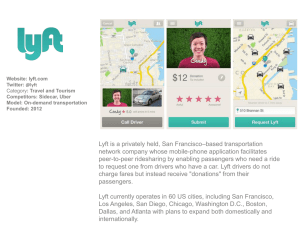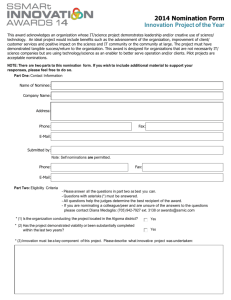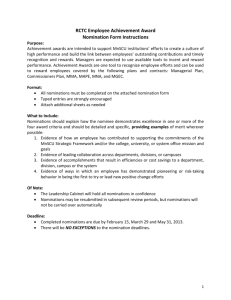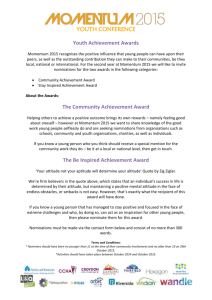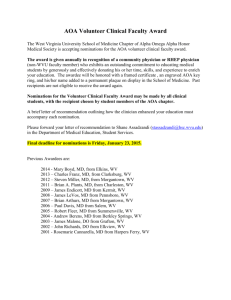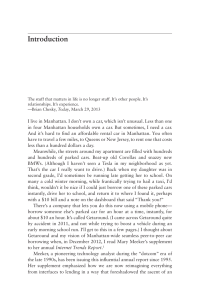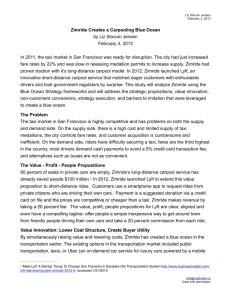docx - Pennsbury School District
advertisement
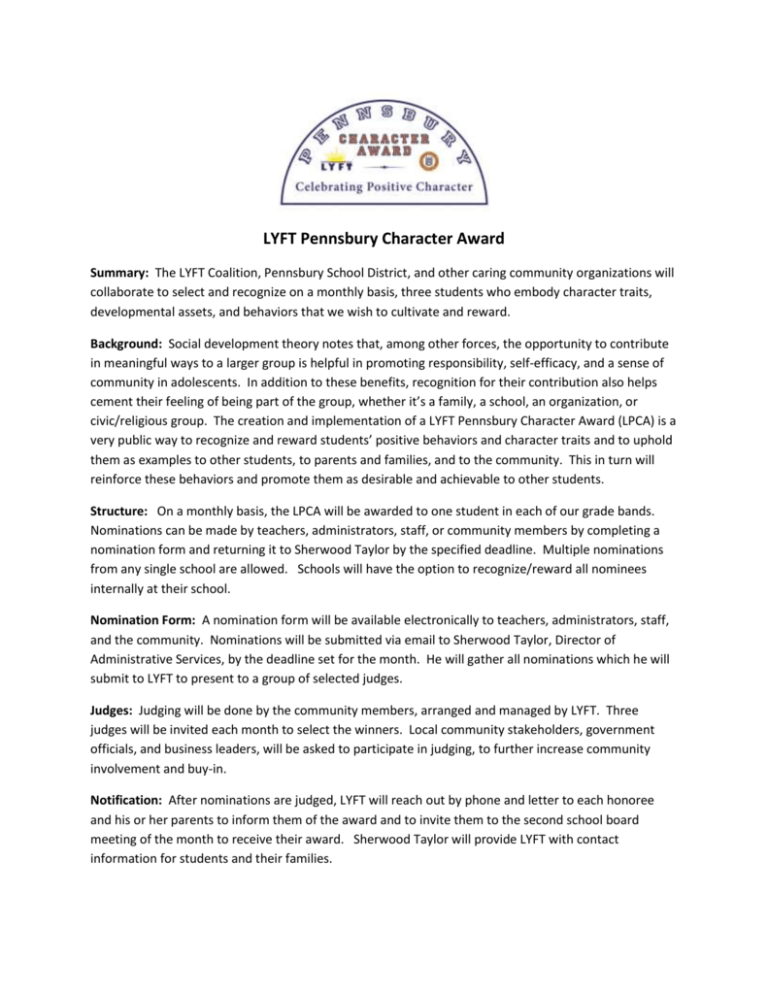
LYFT Pennsbury Character Award Summary: The LYFT Coalition, Pennsbury School District, and other caring community organizations will collaborate to select and recognize on a monthly basis, three students who embody character traits, developmental assets, and behaviors that we wish to cultivate and reward. Background: Social development theory notes that, among other forces, the opportunity to contribute in meaningful ways to a larger group is helpful in promoting responsibility, self-efficacy, and a sense of community in adolescents. In addition to these benefits, recognition for their contribution also helps cement their feeling of being part of the group, whether it’s a family, a school, an organization, or civic/religious group. The creation and implementation of a LYFT Pennsbury Character Award (LPCA) is a very public way to recognize and reward students’ positive behaviors and character traits and to uphold them as examples to other students, to parents and families, and to the community. This in turn will reinforce these behaviors and promote them as desirable and achievable to other students. Structure: On a monthly basis, the LPCA will be awarded to one student in each of our grade bands. Nominations can be made by teachers, administrators, staff, or community members by completing a nomination form and returning it to Sherwood Taylor by the specified deadline. Multiple nominations from any single school are allowed. Schools will have the option to recognize/reward all nominees internally at their school. Nomination Form: A nomination form will be available electronically to teachers, administrators, staff, and the community. Nominations will be submitted via email to Sherwood Taylor, Director of Administrative Services, by the deadline set for the month. He will gather all nominations which he will submit to LYFT to present to a group of selected judges. Judges: Judging will be done by the community members, arranged and managed by LYFT. Three judges will be invited each month to select the winners. Local community stakeholders, government officials, and business leaders, will be asked to participate in judging, to further increase community involvement and buy-in. Notification: After nominations are judged, LYFT will reach out by phone and letter to each honoree and his or her parents to inform them of the award and to invite them to the second school board meeting of the month to receive their award. Sherwood Taylor will provide LYFT with contact information for students and their families. Award: The official award will be presented at the second school board meeting of each month during a very brief presentation by LYFT. In addition to the public recognition through the District and LYFT, each month the three awardees will receive an award certificate signed by Dr. McHugh and Pastor Vicky Allen, Executive Chair of LYFT, as well as a small monetary award provided by a community partner or sponsor. These will given at the school board meeting Publicity: Awardees will be listed on the PSD website, PHS-TV, and other publications if the District wishes. Dr. McHugh may choose to feature these students in the “This Month in Pennsbury” newsletter. A local community newspaper, The Lower Bucks Leader, will publish a photo each month of the winners. LYFT will create and dedicate a page on its website to publicizing the winners. Community Partner: To increase impact and support for the initiative, a community partner or partners will be secured to provide the small monetary award. This will increase community buy-in and help make the event not just a District initiative, but a community one as well. Fairless Hills United Methodist Church has generously committed to supporting LPCA with a donation each month for the 2015-2016 school year. Featured Traits or Assets: The qualities and character traits that we will promote are drawn from the 40 Developmental Assets, according to the following schedule: September: #15 Positive Peer Influence: Young person’s best friends model responsible behavior. The young person is a leader among his or her peers and encourages them to be involved in positive activities, to stand up to bullying, leads by example, etc. October: #30 Responsibility: Young person accepts and takes personal responsibility for his/her behavior. Young person accepts and takes personal responsibility for his/her actions and decisions at home, and/or at school, and/or in the community. Young person acknowledges mistakes and apologizes when appropriate. Young person follows through with assignments, activities, and other commitments. November: #18 (Positive Engagement) Youth Programs: Young person spends three or more hours per week in sports, clubs, or organizations at school and/or the community. The young person demonstrates not only outstanding dedication to one or more clubs or extra-curriculars, but also demonstrates balance with other activities and academics. December: #26 Caring: Young person places high value on helping others. Young person participates in or organizes food or coat drives. Young person participates regularly in community and school-based activities in service of others. Young person demonstrates willingness to assist others on a daily basis in the classroom, halls, or playground. January: #36 Peacemaker: Young person seeks to resolve conflicts peacefully. Young person understands the benefit of peaceful conflict resolution. He/She is considered to be a ‘resource” to others, one who helps to solve problems, e.g. peer mediation or just a good friend who is known to help others with difficult situations. Young person participates in peer mediation, stands up non-violently in the face of bullying, discourages others from bullying, is able to dialogue about differences. February: #35 Resistance Skills: Young person is able to recognize risky or dangerous situations and makes positive choices when faced with challenging events in his/her life. He/She is able to resist peer pressure. March: #28 Integrity: Young person acts on his/her convictions and stands up for his/her beliefs. Young person talks openly about what he/she believes in and values and is willing to thoughtfully express and act upon those beliefs and values in the face of peer pressure. April: #37 Personal Power: Young person has a healthy sense of personal power. He/she believes he/she can effect change and make a difference in his/her school and/or community. He/she believes that he/she has some control over things that happen in his/her world, that things don’t just happen to him/her May: #9 Service to Others: Young person values service to others, in his/her family, school, or community. He/she commits to meaningful and caring actions.
